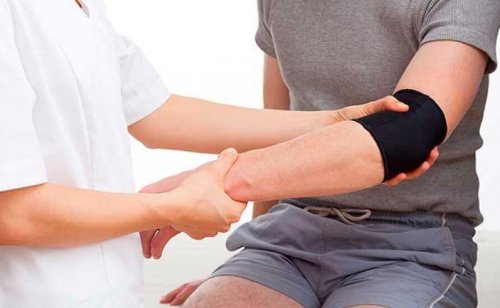How Psychology Can Help You to Recover from an Injury

An injury creates many difficulties, and losses, for any athlete. When professional athletes are hurt, they can’t take full advantage of their time and they can lose their reputation and financial security. That’s why it’s essential to know how psychology can help you to recover from an injury.
Seeing the face of someone who has just suffered an injury is enough to understand the panic flashing through their mind. Beyond pain, what hurts more is the thought of lost time during recovery.
For the professional athlete, the loss is huge. Firstly, this is because spending time away from the field means a shortening of their career. Apart from that, he or she will stop receiving an income from prizes or participation. Finally, he or she will have to hand over their reputation to their rivals.
In terms of the financial aspect, both amateur and professional athletes end up losing something. The amateur has to pay for treatments and the professional loses money on underplayed games.

How psychology can help you to recover from an injury
There are many steps you can take that will allow psychology to help you to recover from an injury. Below, we have listed a brief outline to help you:
1) Accept the fact that you’re injured
A common error nowadays is for athletes to minimize or attempt to directly ignore their injuries. For example, instead of speaking about “tears,” people are more likely to say that they are suffering from a “muscular contraction.”
One of the reasons that this happens is because, as athletes, we are conditioned to never show ourselves in a vulnerable or weak light. That’s why showing pain or admitting that you can’t go to practice, seems unacceptable to many.
Additionally, keeping the extent of an injury a secret, could allow for both doctors and trainers to encourage you to quickly return to the field. What you need to consider is that this is a double-edged sword: it could turn out well, but it usually doesn’t.

2) Organization
Logically speaking, the first thing you should do to treat your injuries is to consult with an appropriate physician. From here, you can establish a course of action that includes clear and tangible dates to resume your training.
As an athlete, it’s of huge importance to realize what has happened to your body. At the same time, you need to be fully aware of the exact conditions you need for rehabilitation.
Establishing dates for each objective will help to free the mind from unnecessary calculations to anticipate your return to the field. That way, you can focus on what’s really important: recovering as efficiently as possible.
3. Recovery is a part of training
There are certain issues that every athlete needs to be aware of. Every year that you compete, it’s practically impossible to avoid pain or even injuries.
As such, you should take the recovery exercises and resting periods for what they are: very important components of a sporting season.
Nevertheless, the objective is to shorten such periods to as little time as possible. What is the secret to achieving this? Firstly, take all of the preventative measures that you can, to avoid being in that position in the first place. Secondly, keep a high level of commitment, concentration, and motivation to withstand the recovery period and its demands.
4) Professional help to manage the process
Of course, if we’re considering how psychology can help you to recover from an injury, we can’t forget to mention the importance of professional help. With a few consultations, every athlete can learn how to handle the anxiety and grief that comes from injuries.
That way, you can return to the activity with confidence. It’s essential, as relapses tend to be frequent and can even become a chronic problem for certain people. Two recommendations that experts often make, to help athletes cope with rehabilitation are:
- Seek support and avoid closing yourself off to try and solve the problem yourself.
- Stay positive and visualize a return to optimal activity.
See also: Stay Motivated – Advice for Sticking to an Exercise Routine
Relaxation is important too. You should consider an injury to be a necessary and useful break, so that you can focus on other things. You have to clear your mind and stay busy.

5) Psychology as a preventative tool
Stress not only affects your daily life, it’s also a central factor in creating injuries during sports. How are these two elements related?
Also read: 4 Best Daily Activities to Lose Weight Without Effort
Throughout a tournament or before important commitments, sportspeople accumulate tension, nervousness, and anxiety. These, as you probably well know, directly affect the functioning of your body and muscles.
As such, the lack of relaxation and the creation of hormones, such as cortisol and adrenaline during inappropriate times, can become vectors for an unexpected injury.
In closing, it’s not that psychology can just help you to recover from an injury – it’s necessary for your recovery. Don’t doubt it. Open your mind and incorporate these efficient techniques, so that your periods of inactivity can be reduced.
An injury creates many difficulties, and losses, for any athlete. When professional athletes are hurt, they can’t take full advantage of their time and they can lose their reputation and financial security. That’s why it’s essential to know how psychology can help you to recover from an injury.
Seeing the face of someone who has just suffered an injury is enough to understand the panic flashing through their mind. Beyond pain, what hurts more is the thought of lost time during recovery.
For the professional athlete, the loss is huge. Firstly, this is because spending time away from the field means a shortening of their career. Apart from that, he or she will stop receiving an income from prizes or participation. Finally, he or she will have to hand over their reputation to their rivals.
In terms of the financial aspect, both amateur and professional athletes end up losing something. The amateur has to pay for treatments and the professional loses money on underplayed games.

How psychology can help you to recover from an injury
There are many steps you can take that will allow psychology to help you to recover from an injury. Below, we have listed a brief outline to help you:
1) Accept the fact that you’re injured
A common error nowadays is for athletes to minimize or attempt to directly ignore their injuries. For example, instead of speaking about “tears,” people are more likely to say that they are suffering from a “muscular contraction.”
One of the reasons that this happens is because, as athletes, we are conditioned to never show ourselves in a vulnerable or weak light. That’s why showing pain or admitting that you can’t go to practice, seems unacceptable to many.
Additionally, keeping the extent of an injury a secret, could allow for both doctors and trainers to encourage you to quickly return to the field. What you need to consider is that this is a double-edged sword: it could turn out well, but it usually doesn’t.

2) Organization
Logically speaking, the first thing you should do to treat your injuries is to consult with an appropriate physician. From here, you can establish a course of action that includes clear and tangible dates to resume your training.
As an athlete, it’s of huge importance to realize what has happened to your body. At the same time, you need to be fully aware of the exact conditions you need for rehabilitation.
Establishing dates for each objective will help to free the mind from unnecessary calculations to anticipate your return to the field. That way, you can focus on what’s really important: recovering as efficiently as possible.
3. Recovery is a part of training
There are certain issues that every athlete needs to be aware of. Every year that you compete, it’s practically impossible to avoid pain or even injuries.
As such, you should take the recovery exercises and resting periods for what they are: very important components of a sporting season.
Nevertheless, the objective is to shorten such periods to as little time as possible. What is the secret to achieving this? Firstly, take all of the preventative measures that you can, to avoid being in that position in the first place. Secondly, keep a high level of commitment, concentration, and motivation to withstand the recovery period and its demands.
4) Professional help to manage the process
Of course, if we’re considering how psychology can help you to recover from an injury, we can’t forget to mention the importance of professional help. With a few consultations, every athlete can learn how to handle the anxiety and grief that comes from injuries.
That way, you can return to the activity with confidence. It’s essential, as relapses tend to be frequent and can even become a chronic problem for certain people. Two recommendations that experts often make, to help athletes cope with rehabilitation are:
- Seek support and avoid closing yourself off to try and solve the problem yourself.
- Stay positive and visualize a return to optimal activity.
See also: Stay Motivated – Advice for Sticking to an Exercise Routine
Relaxation is important too. You should consider an injury to be a necessary and useful break, so that you can focus on other things. You have to clear your mind and stay busy.

5) Psychology as a preventative tool
Stress not only affects your daily life, it’s also a central factor in creating injuries during sports. How are these two elements related?
Also read: 4 Best Daily Activities to Lose Weight Without Effort
Throughout a tournament or before important commitments, sportspeople accumulate tension, nervousness, and anxiety. These, as you probably well know, directly affect the functioning of your body and muscles.
As such, the lack of relaxation and the creation of hormones, such as cortisol and adrenaline during inappropriate times, can become vectors for an unexpected injury.
In closing, it’s not that psychology can just help you to recover from an injury – it’s necessary for your recovery. Don’t doubt it. Open your mind and incorporate these efficient techniques, so that your periods of inactivity can be reduced.
This text is provided for informational purposes only and does not replace consultation with a professional. If in doubt, consult your specialist.








